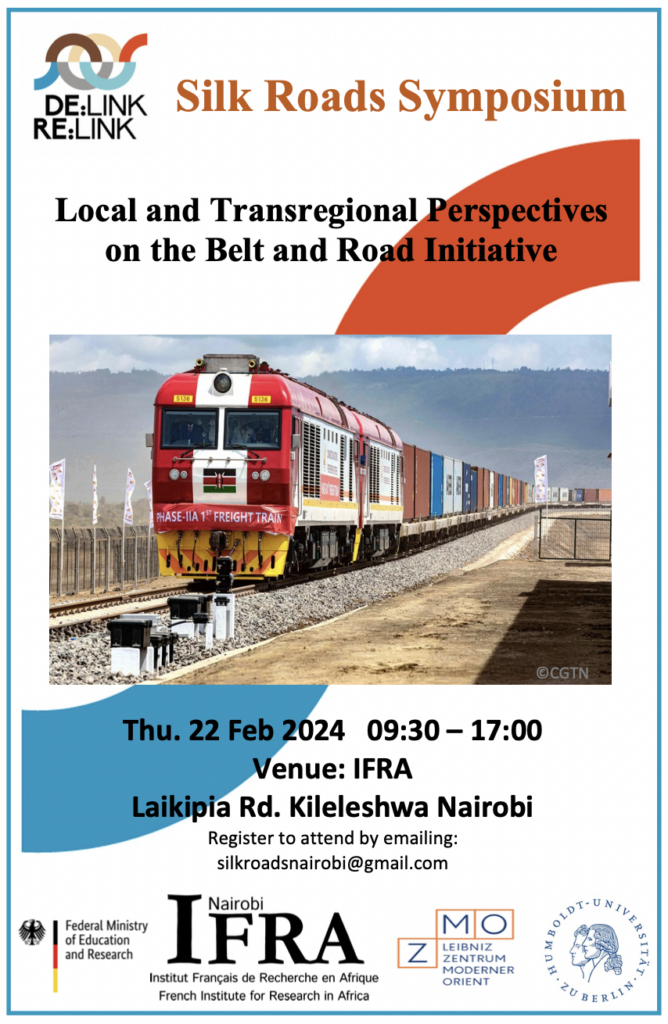
Local and Transregional Perspectives on the Belt and Road Initiative
As China’s Belt and Road Initiative (BRI) forges ahead, it continues to receive exponential media, societal and academic attention globally. Greece’s Piraeus harbor, Kenya’s SGR railway and Sri Lanka’s Hambantota port, amongst others, are often cited in many BRI discussions for diverse reasons. Reactions emanating from these discussions vary, just like the effects of the BRI projects themselves; from very successful outcomes of some; to ambivalent or detrimental effects of others; to comparative debates where BRI projects are compared to other initiatives; to reflections on debt distress amongst participant states. While engaging with notions of “de-linking” and “re-linking” for reflection and exploration of BRI effects and experiences – whereby “link” also stands for drawing from “local insights and new knowledges” – this symposium aims at analyzing current and future BRI perspectives across Asia, Africa and Europe. Within our De:Link // Re:Link research consortium project (based in Berlin), the term “local” does not only include spatial but also, and even more so, relational components. This symposium shall therefore focus on various emergent local and transregional perspectives on the BRI. We envision holding meaningful interdisciplinary discussions whose objective is to lay out and analyze interactions, tensions, challenges and prospects across and beyond specific BRI-related projects. Our deliberations will analyze experiences emanating from interactions amongst African, Chinese and European actors within the contexts of BRI-related projects and beyond. So as to participate in this symposium, kindly register using the email provided on the poster above.
Programme
09:30 – 10:00 Arrival at IFRA
10:00 – 10:05 Welcome remarks Clélia Coret
10:05 – 10:25 Introduction Kai Kresse
10:25 – 10:55 John Njenga Karugia
10:55 – 11:15 Tea break for 20 mins
11:15 – 11:50 Abraham Korir Sing’Oei
11:50 – 12:20 Jerotich Seii
12:20 – 13:00 Kelvin Saidinga and Everline Mugenya
13:00 – 14:00 Lunch break
14:00 – 14:40 Kadara Swaleh
14:40 – 15:20 Gloriah Amondi
15:20 – 15:40 Tea break for 20 mins
15:40 – 16:20 Mohamed Hussein Abdille
16:20 – 17:00 Joint concluding reflections
Speakers and Topics
Abraham Korir Sing’Oei
Topic: Kenya-China Belt and Road Inititiatve Infrastructure Projects: Strategic Partnership and Development Cooperation
Dr. Abraham Korir Sing’Oei is Kenya’s Principal Secretary of Foreign Affairs in the Ministry of Foreign and Diaspora Affairs. Previously he served as Senior Legal Advisor to the Deputy President of Kenya where he provided counsel and guidance on Intergovernmental relations and coordination of international development partnerships with a focus on Open Governance and Rule of Law. He is an International Law expert who served as; Litigation Director, Katiba Institute, Conflict and Rule of Law Specialist at USAID and Founding Director, Centre for Minority Rights Development (Cemiride). He studied and researched on international law in: Kenya, South Africa and USA.
Clélia Coret
Director of IFRA Nairobi (French Institute on Research in Africa)
Dr. Clélia Coret is a Historian and specialist of East Africa and the Swahili coast in the 19th and 20th centuries. She is the director of the French Institute for Research in Africa, Nairobi. She holds a PhD in Contemporary History from Université Paris 1 Panthéon-Sorbonne. She had worked on the history of Witu, a Swahili city-state in the 19th century. Her current postdoctoral research deals with the aftermath of slavery on the Kenyan coast.
Everline Mugenya
Topic: Engineering the Belt and Road Initiative: Kenya’s SGR Railway in Relation to the BRI
Everline Mugenya is a professional with 2+ years experience in rail operation and maintenance. She directly benefited from the Belt and Road initiative through CRBC, securing a full scholarship to pursue engineering at Beijing Jiaotong University in China. Presently, she works at the Kenyan Standard Gauge Railway as an engineer in the Signalling, Communication, Electricity and Information division. She also worked at Timcon Associates, where she participated in consultancy services for the development and implementation of the Road Crash Database System in Kenya for key road stakeholders. Further, she volunteers with Soroptimist International, a global NGO dedicated to women’s empowerment.
Gloriah Amondi
Topic: Reflections on China and Kenya: Living and Studying in China and Teaching Mandarin Language in Kenya
Gloriah Amondi is a trained lawyer, a journalist and a writer. Currently, she writes for ‘Nation Newspaper’. She’s also an essayist and fiction writer and contributes to a popular blog called ‘Bikozulu’. She writes for a science organization named Alliance for Science and is currently a Minority Africa Writers’ fellow and the 2023 International Literary Seminar (ILS) fellowship winner. She has lived and studied in different universities in China including at the Tianjin University of Traditional Chinese Medicine where she briefly studied acupuncture. She speaks English, Swahili, Luo, German and Chinese. When she’s not writing, she teaches Mandarin to children.
Jerotich Seii
Topic: Contradictory Visions and Legacies: Impacts of the Invasion of the Chinese Property Development Association in Nairobi
Jerotich Seii is a humanitarian, development and migration management consultant with 27 years of professional experience in the United Nations and various non-governmental organizations across 30 African countries. In addition to her professional capacities, Jerotich has spent the last six years in Kenya building on citizen-focused action protection of the Constitution, human rights and rule of law in areas of energy, social protection, urban planning and environmental protection. Jerotich, also known as the Active Citizen currently sits on the E-Mobility Policy Taskforce as the Vice Chair.
John Njenga Karugia
Topic: The Belt and Road Initiative in a Transregional Perspective: A Memory Politics and Memory Ethics Perspective on Infrastructure Development
Dr. John Njenga Karugia is a scholar of Transregional Memory Studies, Indian Ocean Studies, Africa-China Relations, Asia Pacific Studies and Area Studies. He is a member of the Frankfurt Memory Studies Platform with a focus on memory politics, memory ethics and responsible cosmopolitanism. He is a visiting professor at the Hasanuddin University in Makassar, Indonesia. He has held several research and teaching positions at Goethe University Frankfurt, Humboldt University of Berlin, University of Leipzig and visiting scholar at Shanghai Maritime University and Duke University. He is a film maker e.g. Afrasian Memories in East Africa available for free on YouTube.
Kadara Swaleh
Topic: Kenya-China Relationship Through the Local Perspective
Kadara Swaleh is a PhD candidate at Freie Universitat Berlin at the Institute of Social and Cultural Anthropology. He is also a research fellow at Leibnitz -Zentrum Moderner Orient (ZMO) Berlin, Germany. His doctoral dissertation focuses on the impact of the Standard Gauge Railway (SGR) on laborers and small traders in the informal sector in Mombasa, Kenya using translocality and theorizing from the South as a heuristic lens. Kadara obtained a bachelor’s degree in sociology and archaeology and a postgraduate degree in religious studies from University of Nairobi. He previously taught at Pwani University’s Department of Philosophy and Religious Studies.
Kai Kresse
Topic: Reflections on the delink-relink approach
Prof. Dr. Kai Kresse is professor of Social and Cultural Anthropology at Freie Universität Berlin, and Vice-Director of Leibniz-Zentrum Moderner Orient (ZMO). He has long worked collaboratively on Kenya and East Africa, on issues in African philosophy, on Swahili thinkers in society, on Islam and Muslim debates, and on Indian Ocean connections. His publications include the two monographs Philosophising in Mombasa (2007) and Swahili Muslim Publics and Postcolonial Experience (2018), and the recent edited volume Rethinking Sage Philosophy (2023), together with Oriare Nyarwath.
Kelvin Saidinga
Topic: Engineering the Belt and Road Initiative: Kenya’s SGR Railway in Relation to the BRI
Eng. Kelvin Saidinga Lenayiarra is a Railway Signaling Engineer at Kenya Railways
Corporation and a beneficiary of the Belt and Road initiative through the CRBC fully funded scholarship. The scholarship aimed to train 100 Kenyan students in railway engineering, maintenance, construction, and management at Beijing Jiaotong University. He previously worked as a maintenance engineer at Ruver Railways Service. He is also a registered graduate engineer with the Engineers Board of Kenya.
Mohamed Hussein Abdille
Topic: China in a Global Perspective: The Chinese State’s Strategic Futures and Alternative Medicine
Prof. Dr. Mohamed Hussein Abdille is professor for human pathology at the Faculty of Medicine, Egerton University. He is a visiting professor at Wuhan Institute of Virology and China Medical University. Through his initiative, many Kenyans have been absorbed to study in Asian Universities. Notable amongst his contributions are the successful establishment of strong bilateral relationships with Chinese and Indian institutions leading to successful initiatives such as establishment of a China-Africa Joint Research Centre at JKUAT, establishment of the Chinese Confucius Institute at Egerton University and five further institutions across Africa. He studied medicine in India, UK, Switzerland, and USA.
The De:Link // Re:Link International Silk Roads Symposium is organized by:
Clélia Coret | Marion Asego | John Njenga Karugia | Kai Kresse | Kadara Swaleh
IFRA Nairobi || Humboldt University of Berlin || Zentrum für Moderne Orient (ZMO)
